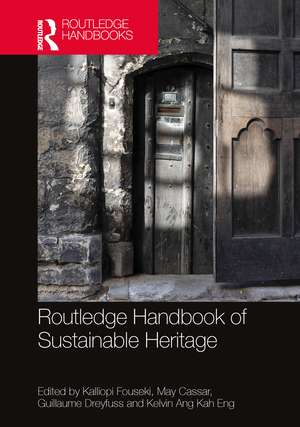Routledge Handbook of Sustainable Heritage
Editat de Kalliopi Fouseki, May Cassar, Guillaume Dreyfuss, Kelvin Ang Kah Engen Limba Engleză Paperback – 29 ian 2024
Organized into six themed parts, the handbook offers cross-disciplinary perspectives on the latest theory, research and practice. Thirty-five chapters offer insights from leading scholars and practitioners in the field as well as early career researchers. This book fills a lacuna in the literature by offering scientific approaches to sustainable heritage, as well as multicultural perspectives by exploring sustainable heritage in a range of different geographical contexts and scales. The themes covered revolve around heritage values and heritage risk; participatory approaches to heritage; dissonant heritage; socio-environmental challenges to heritage; sustainable heritage-led transformation and new cross-disciplinary methods for heritage research.
This book will be an invaluable resource for students and scholars in heritage studies, archaeology, museum studies, cultural studies, architecture, landscape, urban design, planning, geography and tourism.
| Toate formatele și edițiile | Preț | Express |
|---|---|---|
| Paperback (1) | 319.07 lei 6-8 săpt. | |
| Taylor & Francis – 29 ian 2024 | 319.07 lei 6-8 săpt. | |
| Hardback (1) | 1241.29 lei 6-8 săpt. | |
| Taylor & Francis – 29 iul 2022 | 1241.29 lei 6-8 săpt. |
Preț: 319.07 lei
Preț vechi: 355.72 lei
-10% Nou
Puncte Express: 479
Preț estimativ în valută:
61.06€ • 64.20$ • 50.45£
61.06€ • 64.20$ • 50.45£
Carte tipărită la comandă
Livrare economică 16-30 aprilie
Preluare comenzi: 021 569.72.76
Specificații
ISBN-13: 9781032276991
ISBN-10: 1032276991
Pagini: 582
Ilustrații: 76
Dimensiuni: 174 x 246 mm
Greutate: 1.08 kg
Ediția:1
Editura: Taylor & Francis
Colecția Routledge
Locul publicării:Oxford, United Kingdom
ISBN-10: 1032276991
Pagini: 582
Ilustrații: 76
Dimensiuni: 174 x 246 mm
Greutate: 1.08 kg
Ediția:1
Editura: Taylor & Francis
Colecția Routledge
Locul publicării:Oxford, United Kingdom
Public țintă
Postgraduate, Professional, and UndergraduateCuprins
Introduction: Sustainability for Heritage and Heritage for Sustainability. PART I: HERITAGE VALUES AND RISK. 1. Values and sustaining heritage. 2. Heritage and change management. 3. Combining theory and practice: Incorporating value in risk assessment at heritage sites. 4. Heritage values and heritage management frameworks in Nigeria. 5. Evaluating the management plan of Bali Cultural Landscape from the local community’s perspective. PART II: PARTICIPATORY HERITAGE. 6. Managing participatory heritage for enhancing social well-being. 7. Social sustainability and witnessing difficult heritage. 8. Citizen science in sustainable heritage conservation. 9. Community-centred sustainable heritage management: reality and challenges in practice. 10. Heritage conservation as a social process: Assessing social impacts of participatory cultural heritage conservation. 11. Sustainable heritage through a sustainable community. PART III: DISSONANT AND ‘PACIFIC’ HERITAGE. 12. Developing international cultural relations through the negotiation of cultural property disputes: A sustainability perspective. 13. Is World Heritage politically sustainable?. 14. Political ruptures and the cultural heritage of Iraq. 15. Najaf, Iraq: developing a sustainable approach to threatened heritage. 16. Sustaining cultural heritage in post-conflict Syria: The case of Aleppo. 17. Heritage and peace-building: Challenges, possibilities and sustainable practices. PART IV: ENVIRONMENT, HERITAGE AND SOCIETY. 18. Sustainable heritage and climate change. 19. Environmental design strategies for heritage. 20. Energy efficiency in historic buildings. 21. Balancing heritage values, thermal comfort and energy efficiency in world heritage sites: The case of Mexico City. Chapter 22. Food heritage as a catalyst for environmental sustainability: Reflections on the cultural value imbued by citizens to food and its role in supporting scientific debate about food security. Chapter 23. The search for virtue: sustainability and systemic protection of agricultural heritage. PART V: Sustainable heritage-led transformation. 24. A Boundaries Approach to Urban Heritage: The Case of Egyptian Antiquity. 25. Sustaining Heritage Places Crossroads between Urban Imaginaries, Heritage Use and Sustainability. 26. FORT ST ANGELO is not a billboard: Image-driven media and the resilience of the project. 27. Integrating urban conservation into urban planning. 28. Foregrounding ethics in conservation in Singapore: Issues, questions, and framework. 29. Urban values-centred regeneration in the perspective of the circular economy model: An overview of the key issues. PART VI: Inter-temporal and inter-spatial, dynamic heritage research methods. 30. Using system dynamics in heritage research. 31. Port City Resilience: Piloting a socio-spatial method for understanding, comparing and representing linked maritime heritage. 32. Heritage data science. 33. Capturing heritage significance: A critical analysis of economics-based methods. 34. A rambling field role for the heritage practitioner: A means to come to more socially sustainable heritage (re-) development projects. 35. Teaching futures literacy for the heritage sector.
Notă biografică
Kalliopi Fouseki, Professor in Sustainable Heritage Management, UCL Institute for Sustainable Heritage, UK.
May Cassar, Director of the UCL Institute for Sustainable Heritage, UK.
Guillaume Dreyfuss, Director of Research at the Architecture Project LTD, Malta.
Kelvin Ang Kah Eng, Director in Conservation Management of the Urban Development Authority of Singapore.
May Cassar, Director of the UCL Institute for Sustainable Heritage, UK.
Guillaume Dreyfuss, Director of Research at the Architecture Project LTD, Malta.
Kelvin Ang Kah Eng, Director in Conservation Management of the Urban Development Authority of Singapore.
Descriere
This handbook presents cutting-edge and global insights on sustainable heritage, engaging with ideas such as data science in heritage, climate change and environmental challenges, indigenous heritage, contested heritage, and resilience.
